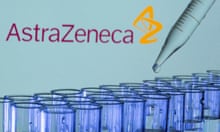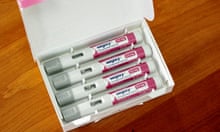Nearly £14bn has been wiped off the stock market value of AstraZeneca over concerns that a new lung cancer drug may not be as successful as had been hoped.
Shares in the Anglo-Swedish pharmaceutical company closed down 8% on Monday after it published the first results from its phase 3 trial for datopotamab deruxtecan, making it the biggest faller among FTSE 100 companies.
The company said the study showed that the drug, which it is developing with Daiichi Sankyo, could halt the progression of a patient’s cancer for longer than the drug currently considered the standard for chemotherapy, docetaxel, but that it was too soon to say with statistical significance if they would also live longer.
Susan Galbraith, the executive vice-president of oncology research and development at AstraZeneca, said the trial results provided “compelling evidence” of the future potential role the drug could play in treating patients with lung cancer.
However, investors wiped almost £14bn off the market value of the £174bn pharmaceutical company after analysts interpreted the early study as indicating the drug may not be as successful as others developed by AstraZeneca, such as Enhertu.
Analysts at Citi greeted the results positively overall but said the drug “may not be the home run in absolute benefit that investors had hoped for”. Some analysts have pinned $10bn (£8bn) to $18bn sales estimates on the new drug.
Analysts at Barclays and Credit Suisse said shareholders had been looking for AstraZeneca to declare the results “clinically meaningful”. The company said clinical significance was a “subjective assessment” and further analysis was required to interpret the results.
The company said an “early trend” in the data, which did not reach the threshold for statistical significance, pointed to better overall survival with the new drug.
AstraZeneca said some patients suffered a side-effect that caused lung scarring, although no more than in previous trials, with the majority classified as “low grade”, although there had also been some “grade 5” events, which means deaths.
after newsletter promotion
Ken Takeshita, the managing director and global head of oncology research and development at Daiichi Sankyo, said the companies planned to share all the data with regulators “to discuss next steps”.









